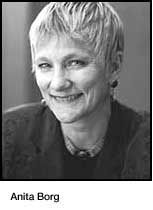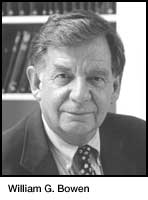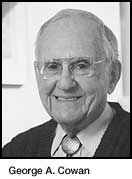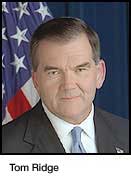Anita Borg
Anita Borg, a respected computer science researcher and advocate for women in the computing professions, will receive an honorary doctorate of science and technology. She is president and founding director of the Institute for Women in Technology.
 Her scientific research focuses on computer operating systems, performance analysis and Web-based communication. She earned a Ph.D. from the Courant Institute at New York University in 1981. For the next several years, she worked on building a fault-tolerant Unix-based operating system at Auragen
Systems in New Jersey and Nixdorf Computer in Germany. In 1986, she moved to Digital Equipment Corporation, where she worked at its Western Research Laboratory and later at its Network Systems Laboratory. At Digital, she developed Mecca, a Web-based system for communicating within an organization.
In 1997, she became a researcher at Xerox Palo Alto Research Center.
Her scientific research focuses on computer operating systems, performance analysis and Web-based communication. She earned a Ph.D. from the Courant Institute at New York University in 1981. For the next several years, she worked on building a fault-tolerant Unix-based operating system at Auragen
Systems in New Jersey and Nixdorf Computer in Germany. In 1986, she moved to Digital Equipment Corporation, where she worked at its Western Research Laboratory and later at its Network Systems Laboratory. At Digital, she developed Mecca, a Web-based system for communicating within an organization.
In 1997, she became a researcher at Xerox Palo Alto Research Center.
As she was building her own reputation in the field of computer science, Borg fostered other women's success. In 1987 she founded Systers, an electronic mailing list for women in computing, which now has 2,500 members worldwide. In 1994 she co-founded the Grace Hopper Celebration of Women in Computing, a biennial technical conference for women. Three years later she established the independent nonprofit Institute for Women in Technology in Palo Alto, Calif. Its mission is to increase the positive impact of women on all aspects of technology and to increase the positive influence of technology on the lives of the world's women.
Borg is a fellow of the Association for Computing Machinery and a member of the board of directors of the Computing Research Association. She helped plan the National Academy of Engineering's Summit on Women in Engineering in May 1999. In July 1999 President Bill Clinton appointed her to the Commission on the Advancement of Women and Minorities in Science, Engineering and Technology.
Borg's work has been recognized with many awards. In 1999 she received the
Distinguished Service Award of the Association for Computing Machinery for her role in promoting an active international community for women in computing. In 2001 she received the A. Nico Habermann Award from the Computing Research Association. This year she received the Heinz Award for
Technology, the Economy and Employment, which is sponsored by the Heinz Family Foundation.
William G. Bowen
William G. Bowen will receive an honorary doctorate of humane letters to recognize his influential thinking on issues in higher education.
Bowen, an economist, has been president of the Andrew W. Mellon Foundation in
New York City since 1988. He earned a Ph.D. from Princeton University in 1958
and was on its faculty for 30 years. He was president of Princeton from 1972 to 1988.
 With former Harvard University President Derek Bok, Bowen wrote "The Shape of the River: Long-Term Consequences of Considering Race in College and University Admissions." The groundbreaking book analyzes the social costs and benefits of race-based admissions on African-American and other students who attended selective universities between the 1970s and the early 1990s.
With former Harvard University President Derek Bok, Bowen wrote "The Shape of the River: Long-Term Consequences of Considering Race in College and University Admissions." The groundbreaking book analyzes the social costs and benefits of race-based admissions on African-American and other students who attended selective universities between the 1970s and the early 1990s.
Bowen also wrote the books "Inside the Boardroom: Governance by Directors and Trustees" and "Ever the Teacher" and co-authored "The Economics of Labor Force Participation," and "The Game of Life: College Sports and Educational Values."
He has warned academicians about the impact of commercialization on education and has commented on the increasing stratification of higher education as well-endowed universities prosper while those with fewer resources fall behind.
Under Bowen's leadership, the Andrew W. Mellon Foundation has transformed itself into a think tank and research institute as well as a grant-making organization. It has nurtured innovative ways of bringing technology into the classroom and makes grants to institutions involved with higher education, art, the performing arts, population, conservation, the environment and public affairs.
George A. Cowan
George A. Cowan is being awarded an honorary doctorate of science and technology in recognition of his tireless work on behalf of scientific research, ranging from the fields of nuclear chemistry to the study of the physiology of the human brain.
 He is a research scientist, academician, businessman and philanthropist. In 1984 he founded the Santa Fe Institute, a private institution that fosters interdisciplinary research among scientists from the physical, biological, computational and social sciences. He was the institute's president from 1984 to 1991 and continues to serve on its board.
He is a research scientist, academician, businessman and philanthropist. In 1984 he founded the Santa Fe Institute, a private institution that fosters interdisciplinary research among scientists from the physical, biological, computational and social sciences. He was the institute's president from 1984 to 1991 and continues to serve on its board.
Cowan received a bachelor of science degree from Worcester Polytechnic Institute in 1941. He did some graduate studies at Princeton, where he worked under future Nobel Prize Laureate Eugene Wigner, whose investigation of uranium was essential to the success of the Manhattan Project. Cowan continued his nuclear research at the University of Chicago and Los Alamos, then came to the Carnegie Institute of Technology for graduate school. During his studies he was an instructor here. He earned a Ph.D. from the Mellon College of Science in 1950.
From 1949 to 1988 he worked at the Los Alamos National Laboratory, serving as
director of chemistry, associate director of research and senior laboratory fellow. In 1990 he received the Enrico Fermi Award for "a lifetime of exceptional achievement in the development and use of energy." In 1997 he was elected a fellow of the American Academy of Arts and Sciences.
At the Santa Fe Institute, where Cowan is a Distinguished Fellow, scientists study nonlinear dynamics, including what is known as chaos theory. They use mathematical equations to predict the behavior of systems, such as insect colonies, human societies and cultures, and economic interactions. For the past decade, Cowan has used neuroscience to study the relationship between physiological changes in children's brains and their behavioral development.
Cowan was a founding director of Los Alamos National Bank and was its chairman for 30 years. He is also a patron of the arts and was a founding board member of the Santa Fe Opera. He and his wife, Helen, were longtime friends of John C. Warner, president of Carnegie Mellon from 1950 to 1965, and they have set up a trust to establish a chair in psychology in Warner's memory. Cowan also serves on the advisory board of Carnegie Mellon's Center for the Neural Basis of
Cognition.
Tom Ridge
Tom Ridge, the country's director of Homeland Security, will receive an honorary doctorate of public policy to recognize his exemplary record of public service as well as his support of higher education and research. Ridge will also give the commencement's keynote address.
In response to the tragic events of Sept. 11, U.S. President George W. Bush appointed Ridge to head the newly created Office of Homeland Security. Ridge left the Pennsylvania governorship last October to fill that post. He is charged with developing and coordinating a comprehensive national strategy to protect the U.S. against terrorist threats or attacks. On March 12, Ridge announced a new color-coded terrorist alert system that will guide government officials and the public on how to respond to threats.
 Born in Pittsburgh's Steel Valley, Ridge was raised in Erie, Pa. He earned a scholarship to Harvard University and graduated with honors in 1967. After his first year at The Dickinson School of Law, he was drafted into the U.S. Army, where he served as an infantry staff sergeant in Vietnam, earning
the Bronze Star for Valor. After returning to Pennsylvania, he earned his law degree and was in private practice before becoming
assistant district attorney in Erie County.
Born in Pittsburgh's Steel Valley, Ridge was raised in Erie, Pa. He earned a scholarship to Harvard University and graduated with honors in 1967. After his first year at The Dickinson School of Law, he was drafted into the U.S. Army, where he served as an infantry staff sergeant in Vietnam, earning
the Bronze Star for Valor. After returning to Pennsylvania, he earned his law degree and was in private practice before becoming
assistant district attorney in Erie County.
Ridge was elected to Congress in 1982 and was overwhelmingly re-elected six times. He was twice elected Governor of Pennsylvania, serving from 1995 to 2001. As governor, he won passage of many educational reforms, including charter schools, alternative education for disruptive students, increased standards and professional development for teachers and a scholarship tax credit for corporations. He increased state aid to public education at the same time he oversaw the largest tax cut in state history. Ridge worked hard to attract high technology companies to Pennsylvania and supported strong technological training for students from pre-school to adults. During his terms, the state invested more than $200 million in education technology.
John H. Seinfeld
John H. Seinfeld, a preeminent scholar in the field of atmospheric science, will receive an honorary doctorate of science and technology. A researcher and educator at the California Institute of Technology, Seinfeld is known for developing the first mathematical models of air pollution in 1972. Scientists around the world use those tools in pollution-control efforts, and they are incorporated into the Federal Clean Air Act.
 After earning a bachelor of science degree in chemical engineering from the University of Rochester, Seinfeld went on to earn a Ph.D. in chemical engineering from Princeton University in 1967. In that same year he joined the faculty of the California Institute of Technology, where he is the Louis E. Nohl Professor and a professor of chemical engineering. From 1990 to 2000 he was chairman of Caltech's Division of Engineering and Applied Science.
After earning a bachelor of science degree in chemical engineering from the University of Rochester, Seinfeld went on to earn a Ph.D. in chemical engineering from Princeton University in 1967. In that same year he joined the faculty of the California Institute of Technology, where he is the Louis E. Nohl Professor and a professor of chemical engineering. From 1990 to 2000 he was chairman of Caltech's Division of Engineering and Applied Science.
Along with Spyros N. Pandis, professor of chemical engineering at Carnegie Mellon, Seinfeld co-authored "Atmospheric Chemistry and Physics: From Air Pollution to Climate Change." The book is one of the most widely used textbooks in the world on atmospheric physics and chemistry. Seinfeld has co-authored three other books and published more than 400 papers. His work has contributed to the understanding of urban air pollution, the production of ozone, acid rain, the impact of aerosols on climate and global climate change. He has warned the public about the effect of aerosols, which limit visibility in cities, creating a human health hazard, and which produce both cooling and heating effects on the Earth's radiation balance.
Seinfeld has served on numerous research and advisory panels. A past president of the American Association for Aerosol Research, he was also vice-chairman and chairman of the Chemical Engineering Section of the National Academy of Engineering. He is chair of the Reactivity Scientific Advisory Committee of the State of California Air Resources Board and vice-chairman of the Committee on Atmospheric Chemistry of the National Research Council.
A member of the National Academy of Engineering and a fellow of the American Academy of Arts and Sciences, Seinfeld has won numerous awards. Last year he
received the Desert Research Institute's Nevada Medal for his work identifying
the complex interactions of chemical constituents in the Earth's atmosphere.
He has been a Distinguished Research Lecturer in Carnegie Mellon's Chemical Engineering Department.
Return to top
Ruth Hammond
(05/10/02)